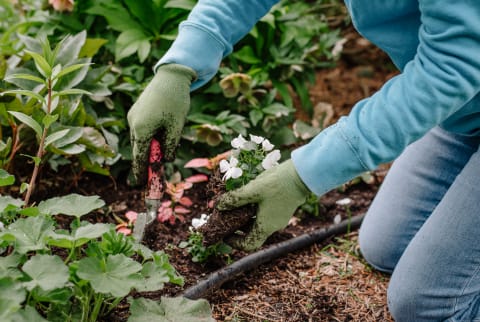Advertisement
How Being In My Garden Has Helped Ease My COVID-19 Anxiety


As social distancing begins to take its place as our new normal, anxiety has become as prevalent as the COVID-19 pandemic itself. We are existing in a perpetual state of unknown—and this is where anxiety thrives.
I've lived with a severe anxiety disorder for most of my life. I was officially diagnosed with generalized anxiety disorder, panic disorder, and major depressive disorder over a decade ago and quickly became addicted to the medication that was prescribed to help me. This year I celebrate seven years in recovery from prescription drug addiction.
Throughout my journey, I've discovered practices that help, including yoga, meditation and juicing, along with my unwavering faith in God. However, during this unprecedented time, a new healing modality has become my go-to for managing anxiety—gardening.
How I started gardening.
I grew up in one of the most dangerous cities in America, and food insecurity was as prevalent as the poverty that surrounded us. Limited resources made it increasingly difficult to get quality, nutrient-dense foods regularly in my community. As I grew up, I started to explore gardening as a way to understand where my food came from.
As an avid juicer, I knew the role my diet played in the management of my anxiety disorder, so the idea of creating a sustainable food source for myself and my family prompted me to buy some seeds. I started small, growing herbs, ginger root, and aloe vera in the windowsill of my modest two-bedroom apartment.
How gardening helps ease my anxiety.
My anxiety creates an obsessive, sometimes paralyzing negative thought process that can culminate in a full-blown panic attack. Gardening helps me to reset the focus points of my mind, allowing me to separate from my fears in the moment. The ego is a gateway to anxiety, and gardening acts as a reminder of our role in the world—that we are not at the center of the universe but that we are all a part of something larger. A study conducted by Bristol University and University College London even showed that the bacteria in soil has the potential of activating the brain to produce serotonin, our body's happy chemical, comparable to the effects of antidepressants.
Gardening has become my yoga practice. Similar to asana and meditation, by stimulating our senses, anxiety symptoms are reduced by keeping us in the present moment. The act of gardening itself is a practice in mindfulness. Being aware of the different colors of plants, noticing the different textures of soil, knowing what to prune and when, along with making sure not to over-water or under-nurture seedlings all require us to be mindful and fully engaged.
Just like in horticulture, it is important for those of us living with anxiety to prune away negative thoughts and behaviors. We need to be consciously aware of what we are cultivating in our minds and how that will translate in our behaviors.
How to get started.
There is no space requirement or prior experience needed to begin a gardening practice. Starting can be as simple as planting seeds in a small pot on your fire escape or windowsill. You can begin small like I did and work your way up to a larger plot of land, if you choose. All you need are seeds, potting soil, an all-natural fertilizer, and a planter pot. Despite social distancing, a lot of gardening centers and nurseries are still open in many places. If they are not open in your area or if you'd rather not leave home, everything you need to get started can be delivered.
Today I have five raised beds in my backyard and my family garden has grown to include kale, lettuce, cabbage, spinach, cauliflower, beets, cucumbers, and many more. My wife and I are also creating additional space in our yard to include a new bee colony for organic honey production. Gardening has served as a great way to connect with my wife and kids and take advantage of the mandated stay-at-home order that is currently in place. It's exciting to go out in the garden in the morning with my family and see how our seeds have sprouted and what new growth awaits.
We may not be in control of what is happening around us or to us, but we can control how we allow it to affect our mental health. For me, I've found solace in gardening, but it's really about finding the thing that brings you peace among the chaos.